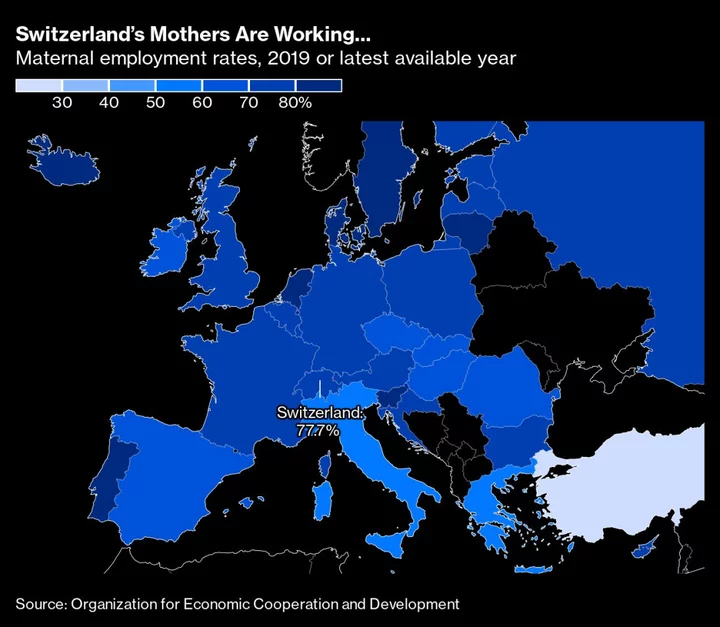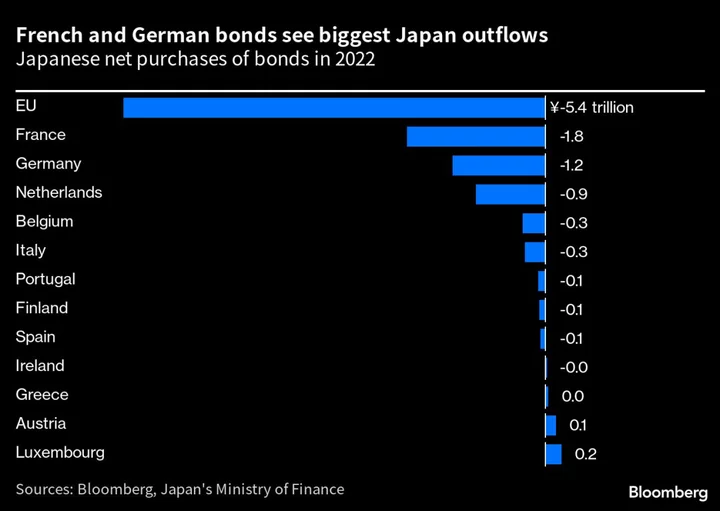When Kerstin Roethlisberger had children, she did what mothers in Switzerland do more than anywhere else in the advanced world: she switched to working part-time.
The school teacher, now 52, found that to be a “dream solution.” But it was also pretty much the only option, given her husband was working full-time, and affordable childcare wasn’t available.
Roethlisberger’s example remains commonplace in Switzerland, which stands out from OECD peers as the country with the largest proportion of mothers in employment who work part-time, and has a noticeably wide gender wage gap too.
Fewer hours spent laboring mean lower pay, less experience and smaller pensions, exacerbating inequalities between the sexes and leaving women worse off if they want to end a partnership.
While the Swiss employment market has effectively shaped itself around parenthood, partially making up for lackluster support from the state, it’s also entrenching traditional family templates.
“When I look at the young girls here — of course they all still grow up with these role models: Mom is at home, Dad goes to work full-time, Mom works a little,” Roethlisberger said in an interview from Berneck, a rural settlement of about 4,000 people that’s a short ride from Lake Constance.
One result is Switzerland’s impressive rate of female labor participation, which is among the top 10 within the OECD. But that toe-hold for mothers in employment only goes so far, losing valuable employment hours that could otherwise boost productivity.
That tension showcases the limits of the Swiss approach just as rapidly worsening demographics push advanced-world economies to consider how to balance family life with work while nurturing fertility too.
With Switzerland in particular, a nation which has lagged others with measures to encourage parenthood and boost equality, it demonstrates how relying on the flexibility of employers isn’t enough.
Part-time jobs are a structural part of the employment landscape. Most vacancies currently listed on the Swiss National Bank’s website, for example, specify the option of doing less than a full working week.
But there’s a flip side: On average, Swiss women earn 18% less than men. That’s toward the upper end in an international comparison, though not as much as South Korea’s 31% or Israel’s 24%.
What is striking is the difference marital status makes. While unmarried women in Switzerland earn only 5% less than unmarried men, the gap is 25% for married couples — and that’s already adjusted to reflect full-time work. Taking part-time working women into account, the difference in aggregate salaries would be even bigger.
Those numbers illustrate how Switzerland preserves the traditional family-model of the husband pursuing his career supported by his wife, who stays home and takes care of the children.
Education schedules cement the problem. While other European countries have sought to establish full-day schools with lunch halls, Swiss kids often still eat at home. Until sixth grade, Roethlisberger’s children turned up every day from noon to 1 p.m. before heading out for afternoon classes.
Rural and German-speaking Switzerland where she lives is particularly conservative. Childcare services there are scarce, expensive, and — at least traditionally — frowned upon. But the urban picture isn’t much better.
Meghan O’Donnell, a Canadian mother in Basel, relies on daycare for her 3-year-old daughter while she works full-time as a corporate manager in Switzerland’s third-biggest city.
It costs her 2,500 francs ($2,760) per month, while afternoon activities, health insurance and the occasional babysitter add another 1,000 francs to that bill.
“There’s a reason that in this country, I only have one child,” said the 36-year-old O’Donnell, observing that it would be “incredibly difficult” to balance her job with multiple kids, and no grandparents around to help out.
Still, a democracy — and, in Switzerland’s case a very direct one at that — is shaped by the preferences of its citizens.
It was only in 2021 that the Swiss instituted two weeks of leave for new fathers. While Genevans voted this month in favor of a 24-week leave measure parents can share between them, Bern’s citizens rejected a proposal for 40 weeks, and a Zurich ballot last year opposed one suggesting 18 weeks for each partner. Cost worries were one motivation for such rejections, but underlying views may have also played a part.
In the fight for equal pay, some women are taking to the streets. Earlier this month, Zurich police armed with pepper spray dispersed a so-called “feminist strike” protest over wage disparities.
The plight of Swiss women was highlighted by a report from the World Economic Forum this week, which saw Switzerland drop eight places in its so-called Global Gender Gap Index. Particularly low was the country’s score for economic participation, where it’s ranked 63rd.
Prevailing attitudes are hard to shift. A survey last November of almost 10,000 students and junior professors at Switzerland’s two largest universities found most young women there support the existing part-time model, and that they “base their educational and career choices on their actual or potential partner’s career paths,” according to a resulting paper.
Lower childcare provision reflects less demand, according to social economist Melanie Haener, who cited a survey of households where 78% of respondents said they don’t need it. Part-time working mothers commonly look after the kids themselves or rely on grandparents, she said.
But a lack of options will only reinforce the existing setup. That won’t help to shore up a fertility rate of 1.51 children per woman, below the OECD average.
“If you have to pay for childcare, it’s not worth it at all for both partners to work,” said Roethlisberger in Berneck. “Judging from the fact that children are the future, I think Switzerland is extremely backward.”
--With assistance from Caroline Alexander.









